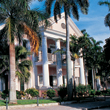| Source: Date: Updated: |
TheBahamasInvestor.com
Wednesday, September 1, 2010 Wednesday, September 1, 2010 |
The Bahamas at a glance
Location: The 100,000-square-mile (258,998-square-kilometre) archipelago of The Bahamas begins just 50 miles (80km) off Florida’s east coast at the island of Bimini and stretches more than 500 miles (804km) southeast in a chain comprised of some 700 islands and cays in the North Atlantic Ocean. The capital, Nassau, is on New Providence. Freeport/Lucaya on Grand Bahama is the second largest city. Total land mass is estimated at 5,382 sq mi (13,939 sq km), approximately the size of Connecticut.
Time zone: Eastern Standard Time*, same as New York, Boston, Miami and Toronto. At 12 noon in Nassau, it is 5pm in London, 6pm in Geneva, 9:30pm in New Delhi, 1am in Beijing and 2am in Tokyo.
History: Columbus became The Bahamas’ first celebrity visitor when he “discovered” the New World, landing on San Salvador in 1492. Over the next three centuries, the islands became key waypoints for explorers and adventurers along routes linking the Old World with the New. During the late 17th century, the islands became a hotbed of pirates and privateers who preyed upon merchant ships. The Bahamas became an official crown colony of Great Britain in 1717. Slavery was fully abolished in 1838. Limited self-rule was granted in 1964, and The Bahamas became an independent, self-governing nation on July 10, 1973, which is celebrated as Independence Day.
Government: The Bahamas has enjoyed political stability since independence, and its popularly elected parliament traces its heritage to the House of Assembly, which first met in 1729. The political system is based on the British Westminster model with a Governor General, a Prime Minister and a Parliament. The two primary political parties are the Progressive Liberal Party (PLP), which held power from 1967 to 1992, and again from 2002 to 2007, and the Free National Movement (FNM), which governed between 1992 and 2002 and was re-elected for a five-year term in 2007. Queen Elizabeth II is the nation’s sovereign; Hubert Ingraham, who is Prime Minister, presides over a 41-member Parliament (24 FNM; 17 PLP).
Economy: The Bahamas, while actually located in the Atlantic, is a member state in the Caribbean Community (CARICOM) Secretariat, although not its common market. About 50 per cent of the country’s gross domestic product (GDP) is related to tourism, which employs over half of the workforce. New investments in hotels, resorts and developments range from billion-dollar mega-projects on New Providence to distinctive communities in the Out Islands. As an attractive locale for offshore banking and investment, the next biggest economic driver is the financial services industry, which accounts for between 15-20 per cent of GDP. The construction industry drives 10 per cent. Agriculture and fisheries comprise less than five per cent of the economy. Mineral resources are salt and aragonite.
Population: Estimated at 342,000 in 2009, with annual growth of 1.8 per cent. Nearly two-thirds of the population resides on New Providence. About three in 10 people are under 15; 62.7 per cent are between 15 and 59 years old; 7.9 per cent are 60 and older.
Financial services: The Bahamas has carved out a specialized niche as a leading offshore financial centre, largely favoured by Canadian, Swiss and US institutions. The Bahamas has around 250 licensed banks and trust companies. Some 60 institutions are licensed to provide fund administration and around 90 are licensed to provide broker-dealer and/or investment advisory services. One of the greatest appeals of using The Bahamas as a domicile for corporate and financial services is its tax-free status; no taxes are levied on personal income, capital gains, corporate earnings, sales, inheritance or dividends.











